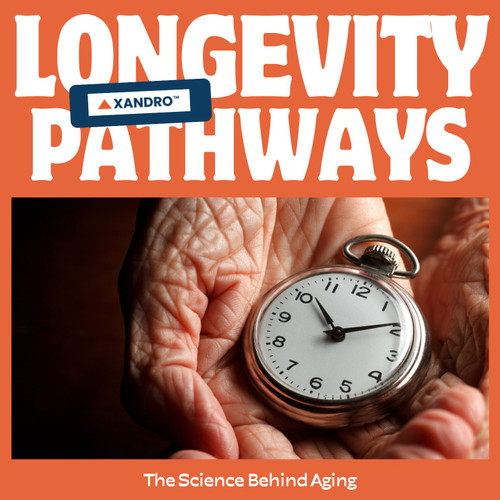Factors that Affect Longevity: Longevity Research on Lifespan Extension
7th Jul 2024
Longevity factors and what contributes to how long someone will live is a field of research gaining momentum.
While life expectancy varies from country to country, in 2024, life expectancy in the world is 73.33 years old, but many longevity experts are claiming we’ll soon be living to 120.
Longevity experts, from longevity gurus sharing their journeys online to scientists conducting clinical trials, have been researching a range of compounds and supplements that may be your answer to the question, ‘How can you increase your life expectancy?’
It’s important to also understand what affects aging to begin with, and while there aren’t universally accepted answers, longevity research is revealing a range of longevity pathways that give us insight into why we age, which this article will cover.
It’s a long one, so jump there now:
- What are the Factors that Affect Longevity?
- Sirtuins
- mTOR Pathways
- AMPK Pathway
- NAD+ and NAD+ Precursors
- Telomeres and Telomerase
- Senescence and Senolytics
- Autophagy
- Mitochondrial Function
- Hormesis and Stress Responses
- Epigenetic Modifications
- Extracellular Matrix (ECM)
- Hormonal Pathways
- Inflammation
- Genomic Stability
- Microbiome
- Yamanaka Factors
- Human-Influenced Longevity Pathways
- Longevity Regulating Pathways
- Further Longevity Research
Longevity: how to live longer. It’s what many of us want to know, but, like all complex subjects, there are actually many reasons for how humans age.
Several longevity pathways are currently being researched, with scientists trying to learn about and test various approaches to extend the human lifespan and improve health the older we get.
Here are some of the current key areas of focus:
When scientists talk about sirtuins and lifespan, they’re talking about SIRT1 through to SIRT7. These are proteins that the body uses to regulate cells, for DNA repair and metabolism, to protect against inflammation and to help resist stress.
It’s been found that some of the foods we require in our diets help activate sirtuins, particularly SIRT1, which is being studied for its potential to mimic the effects of calorie restriction. That’s why you will see supplements like resveratrol being recommended and researched, as resveratrol, found in foods like grapes, dark chocolate, peanuts and blueberries, activates SIRT1.
Dr. David Sinclair, in particular, is known for his research into sirtuins and resveratrol as potential to extend lifespan.
Longevity and mTOR pathway are other factors that may influence how we age. Mechanistic Target of Rapamycin (mTOR) is a protein that plays a crucial role in how our cells grow, divide and survive, as well as our metabolism. Think of mTOR as a master switch in our body that controls various cellular processes.
Essentially, mTOR acts like a sensor, detecting nutrients, energy levels and growth factors in our body, and when mTOR is activated, it promotes cell growth, protein production and energy usage, helping our cells to grow and function properly. It also helps cells survive by preventing autophagy, a process where cells break down their own components to recycle nutrients and clear out damaged parts.
So, it’s good, right? To an extent. When mTOR is highly active, it promotes growth and prevents cells from entering a self-cleaning mode ( autophagy). While this is good for growth, it can lead to faster aging and age-related diseases because damaged cells and proteins accumulate.
For this reason, it’s been found that reducing mTOR activity, such as through drugs like rapamycin, may extend lifespan. Lower mTOR activity slows down cell growth and boosts autophagy, which helps clear out damaged cells and proteins. This process is linked to better health and longevity.
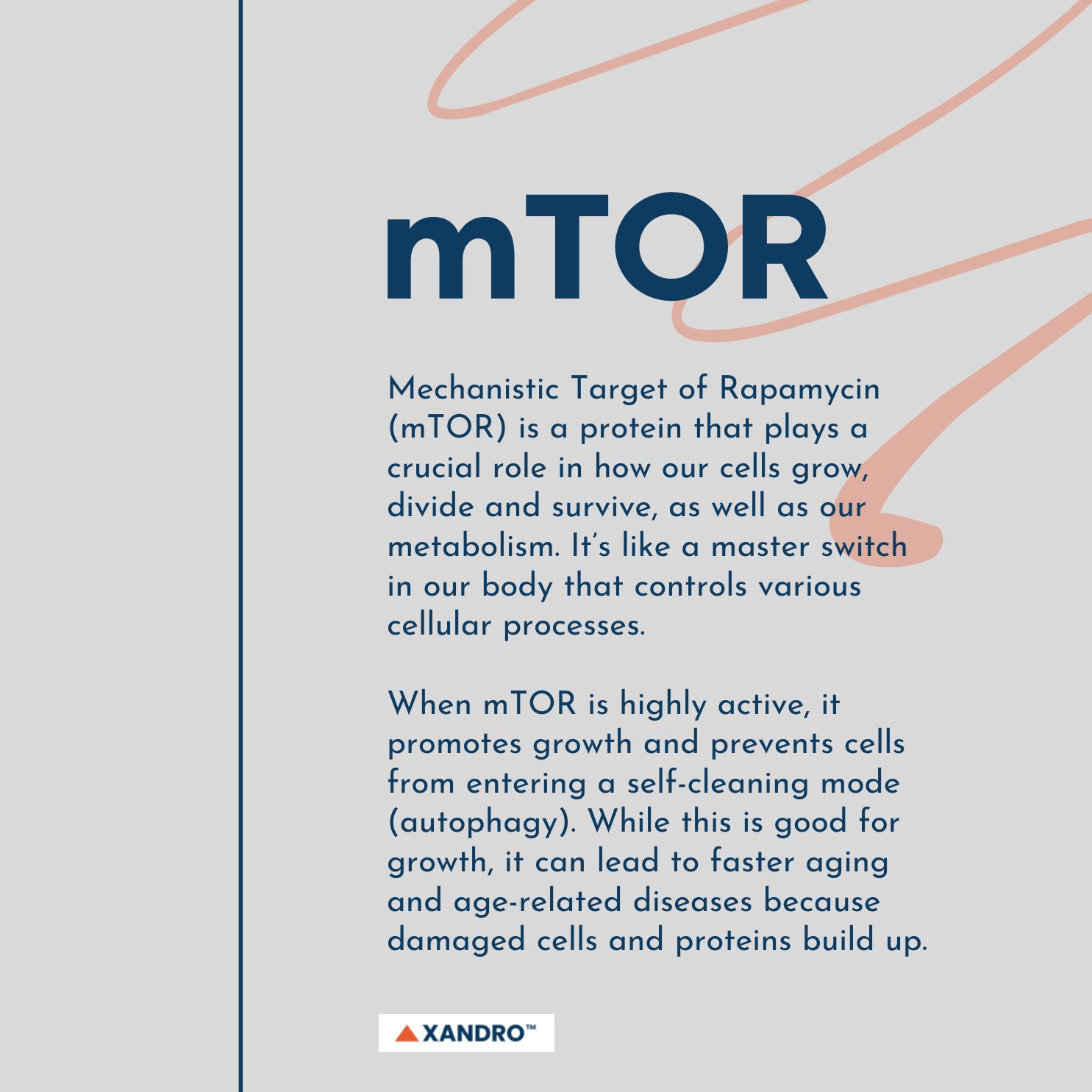
Another of the important factors for longevity is known as the AMPK pathway. AMP-activated protein Kinase (AMPK) is a protein that acts like an energy sensor in our cells. It's essential for maintaining energy balance and can influence how long we live.
AMPK keeps track of the energy levels in our cells by sensing the amount of AMP (a molecule that indicates low energy) and ATP (a molecule that indicates high energy). When energy levels are low (high AMP), AMPK activates pathways that produce more energy and conserve existing energy. It also regulates our metabolism by turning on processes that generate energy, like fat breakdown and sugar uptake, and turning off processes that consume energy, like protein and fat synthesis.
By making sure our bodies are using energy efficiently, AMPK helps maintain cellular health and function, which is needed for longevity. Interestingly, AMPK also activates autophagy, a process where cells clean out damaged components and recycle nutrients, similar to how reducing mTOR activity does. This cleanup process is crucial for preventing cellular damage and promoting longevity. What’s more, AMPK also enhances our cells' ability to withstand stress by improving their energy balance and survival mechanisms.
Due to this, researchers have been looking into AMPK and it’s been found that by activating this protein, through compounds like metformin, for example, there may be a chance of improving lifespan.
Nicotinamide adenine dinucleotide, commonly known as NAD+, is a coenzyme found in all of our living cells. NAD+ is essential for converting the food we eat into energy. It helps enzymes in our cells produce ATP, the main energy currency of the cell. It also supports enzymes involved in repairing damaged DNA. This is crucial because DNA damage builds up over time and can lead to aging and diseases.
NAD+ is also needed in communication between the cell nucleus and the mitochondria (the powerhouse of the cell), ensuring that cells function properly.Higher levels of NAD+ help maintain efficient energy production, which is vital for cell health and function, and by supporting DNA repair mechanisms, NAD+ helps prevent the build-up of genetic damage that can contribute to aging and age-related diseases. NAD+ also activates sirtuins (see above)!
As we age, our NAD+ levels decline, which has led to researchers looking for ways to try to maintain NAD+ levels in humans to extend lifespan.
A key way this can occur is through NAD+ precursors, meaning taking supplements of compounds that are used in the body to make NAD+. The reason why people don’t take NAD+ supplements is because it’s too large of a compound for the body to absorb, so by consuming a precursor, your body can then make it itself.
Studies have found that taking nicotinamide mononucleotide (NMN) or nicotinamide riboside (NR), can improve NAD+ levels, as well as mitochondrial function and overall, improve longevity.
NAD+ levels are also influenced by food and supplements. You can check out Xandro Lab’s Pure NMN here!
Telomeres, often likened to the plastic tips of shoelaces, are the protective ends of our chromosomes that prevent them from getting tangled or frayed. With each cell division, these telomeres shorten, contributing to the aging process.
As telomeres shorten, cells eventually reach a point where they can no longer divide successfully, leading to cell death and tissue aging. This process is linked to various aging-related conditions, including cancer and an increased risk of death since cell division is essential for the growth of new skin, blood, and bone cells.
Research is currently focused on telomerase, an enzyme that can extend telomeres and potentially delay aging. By activating telomerase, scientists hope to maintain telomere length and promote healthier, longer cell life. This approach could help prevent the effects of cellular aging and improve overall longevity, offering promising insights into how we might extend healthy lifespans in the future.
Further Reading: All About Telomeres
Senescence is a state where cells stop dividing and enter a kind of ‘retirement’ phase. These cells are no longer active in terms of growth and division, but they don’t die off immediately either. Instead, they remain in the body, called cellular senescence, and can cause various problems and contribute to aging.
One reason senescence occurs is that over time, factors like radiation, toxins or normal cellular processes can damage DNA. What’s more, every time a cell divides, the protective caps on the ends of chromosomes, telomeres (see above), get shorter, and when they become too short, the cell can no longer divide safely and enters senescence. Chronic stress or inflammation can also push cells into senescence.
This impacts our longevity as senescent cells can release harmful chemicals that cause inflammation and damage surrounding healthy cells. This contributes to aging and age-related diseases like arthritis, heart disease and cancer, and a buildup of senescent cells can impair the function of tissues and organs.
Researchers are looking into using drugs called senolytics to help with this. These are a class of drugs or compounds designed to target and remove senescent cells. By getting rid of these ‘dead’ cells, senolytics aim to reduce their negative effects on the body and help with healthier aging, such as reducing inflammation.
Studies in animals have shown that senolytics can improve physical function, reduce age-related diseases and extend health span. By reducing the burden of senescent cells, senolytics have the potential to extend lifespan as well, with more than 20 clinical trials currently ongoing.
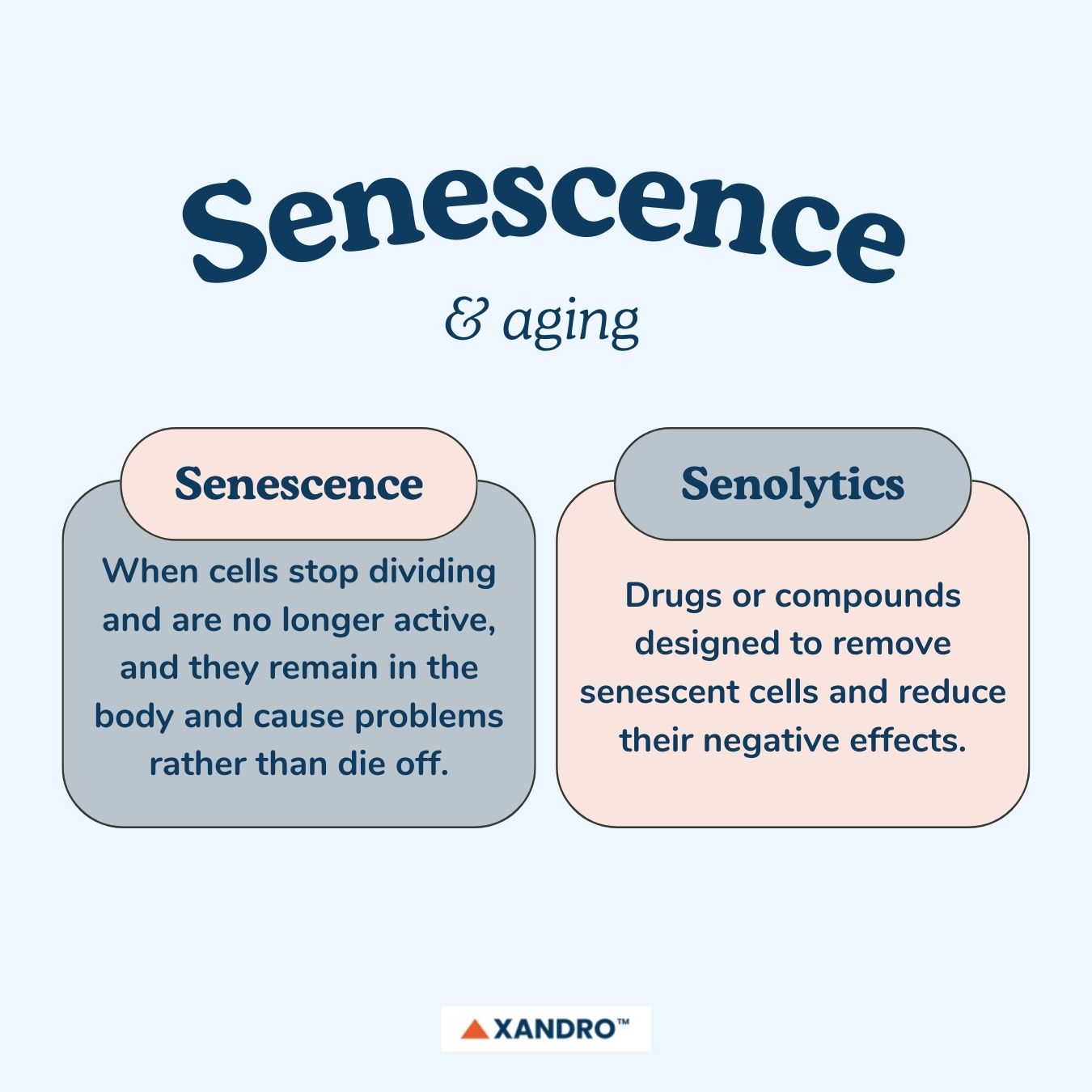
Autophagy is a natural process by which cells clean out and recycle their own damaged components. The word ‘autophagy’ literally means ‘self-eating,’ but it’s a good kind of eating — like taking out the trash and recycling useful parts to keep the cell healthy.
By regularly clearing out damaged components, autophagy helps maintain cellular function and prevents the buildup of toxic materials that can cause diseases. Research has found that enhancing autophagy can reduce the risk of several age-related diseases, including neurodegenerative diseases like Alzheimer's, cardiovascular diseases and cancers.
It also helps regulate your metabolism by ensuring that cells efficiently use nutrients and energy, contributing to better overall health. Also, cells that undergo regular autophagy are better able to handle stress, which helps them survive longer and function better.
Interventions like calorie restriction and certain drugs aim to boost autophagy. For instance, spermidine is believed to stimulate autophagy, acting as a cellular cleaning mechanism. By inducing autophagy, these interventions can improve metabolism and energy expenditure, potentially contributing to increased longevity and better overall health.
Mitochondria are often called the ‘powerhouses’ of the cell because they produce most of the cell's energy. They are tiny structures within our cells that convert the food we eat into energy that the cell can use. This energy is stored in molecules called ATP (adenosine triphosphate).
Mitochondria are also involved in signalling pathways that affect cell growth, differentiation and death, and they play a role in apoptosis, the programmed death of cells, which is essential for removing damaged or unnecessary cells.
Healthy mitochondria produce energy efficiently, which is needed for all cellular functions, especially since proper energy production supports better overall health and function of tissues and organs. Mitochondria can also produce reactive oxygen species (ROS) as byproducts, which can damage cells if not properly managed, so efficient mitochondria produce fewer ROS, reducing oxidative stress and cellular damage.
Mitochondrial dysfunction has been linked to many age-related diseases, such as neurodegenerative diseases (like Alzheimer's), cardiovascular diseases and metabolic disorders, so maintaining healthy mitochondria can help prevent or delay these conditions. They also play a role in cellular repair processes, meaning, if functioning properly, they can help cells recover from damage more effectively.
Scientists have been looking into ways of improving mitochondrial function and biogenesis to combat aging.
Hormesis is a biological process where a mild or moderate stressor or toxin can have beneficial effects on the body by activating adaptive stress responses. Essentially, a small amount of stress can make your body stronger and more resilient.
When your body is exposed to a low level of stress, such as exercise, calorie restriction or certain plant compounds, like polyphenols, it triggers a response to cope with the stress. For example, exercise induces mild stress on muscles, leading to stronger and healthier muscle tissue over time. Similarly, low doses of certain chemicals or environmental stressors can activate protective pathways in cells, promoting longevity and resilience. Other ways of achieving hormesis are through heat shock and ice baths.
This stress response involves activating various protective mechanisms in the body, such as increased production of antioxidants, enhanced DNA repair and improved protein maintenance. Over time, these protective mechanisms make the body more resilient to higher levels of stress and reduce the risk of damage from more severe stressors.
In this way, hormesis promotes mechanisms that repair DNA, proteins, and other cellular components, reducing the risk of age-related diseases. Hormetic stress can also improve metabolism, making the body more efficient at using energy and reducing the risk of metabolic disorders like diabetes.
Therefore, by regularly activating stress responses, the body becomes better at handling various stressors, leading to increased resilience and potentially a longer lifespan.
Now, this one is obvious and one we cannot control. Genetic factors in longevity begin from the moment we are born. Despite this, something called gene expression regulation is something scientists are looking into.
Epigenetic modifications refer to changes in gene activity that do not involve altering the DNA sequence itself. These changes can turn genes on or off and influence how cells read the genes, affecting how they function. This can include:
- DNA Methylation: This involves adding a chemical group called a methyl group to DNA, usually at specific sites. When DNA is methylated, the associated gene is typically turned off.
- Histone Modification: DNA is wrapped around proteins called histones. Chemical changes to these histones can either tighten or loosen their grip on DNA, making the genes more or less accessible for reading.
- Non-Coding RNA: These are RNA molecules that do not code for proteins but can regulate gene expression by interacting with other molecules involved in gene activity.
Epigenetic modifications can turn on genes that protect against aging or turn off genes that promote aging. For instance, genes involved in DNA repair and stress responses can be activated, while genes that promote inflammation can be suppressed.
Diet, exercise, stress and exposure to toxins can all also influence epigenetic modifications and, interestingly, some epigenetic changes can be passed from one generation to the next, meaning that the lifestyle choices of parents can impact the health and longevity of their children.
It’s essentially genetic engineering, where researchers are looking into ways to manipulate genes associated with aging. A recent study found an 82% increase in the lifespan of yeast cells by genetically rewiring the circuit that controls aging. This approach involves creating synthetic gene oscillators to prevent cells from following set paths of decline and death. While not yet tested in humans, by changing gene expression, scientists may be able to modify vulnerability genes and genes involved in aging to help prolong longevity.
Dr. David Sinclair has proposed the Information Theory of Aging, which suggests that aging results from the progressive loss or corruption of epigenetic information stored as molecular modifications on DNA.
Think of the ECM as the ‘glue’ and ‘framework’ that holds everything together in the body, while also acting as a communication hub for cells. It’s a network of molecules that surround and support the cells within our tissues, kind of like a scaffold that provides structure and helps cells stick together.
The extracellular matrix is made up of proteins like collagen, elastin and fibronectin, as well as other substances like glycoproteins and proteoglycans. These molecules form a complex, three-dimensional structure. It gives physical support to the cells, helping to maintain the shape and integrity of tissues and organs, and plays a critical role in cell signalling, allowing cells to communicate with each other and respond to their environment. This communication is needed for processes like growth, healing and development. The ECM also influences cell behaviour, including how cells grow, move and differentiate (turn into different types of cells).
Over time (as we age), the proteins in the ECM, like collagen and elastin, break down and are not replaced as efficiently, leading to a loss of structural support, making tissues less firm and elastic. Damaged proteins and other molecules can also build up in the ECM, which can interfere with normal cell functions and tissue repair processes. All of these changes in the ECM affect how cells communicate with each other, resulting in cells not receiving the right signals for growth, repair or maintenance, leading to a decline in tissue function.
Since the ECM plays a key role in tissue repair, with aging, its ability to support this repair diminishes, and this slower repair process makes it harder for the body to recover from injuries and daily wear and tear. What’s more, as the ECM components degrade, tissues can become stiffer, which can impair the function of organs and systems, like making skin less flexible or affecting the heart and blood vessels.
In this way, the ECM undergoes changes that contribute to the aging process in the body. Researchers are currently studying how to go about ECM remodelling, which is essentially trying to maintain the integrity and function of the ECM as we age.
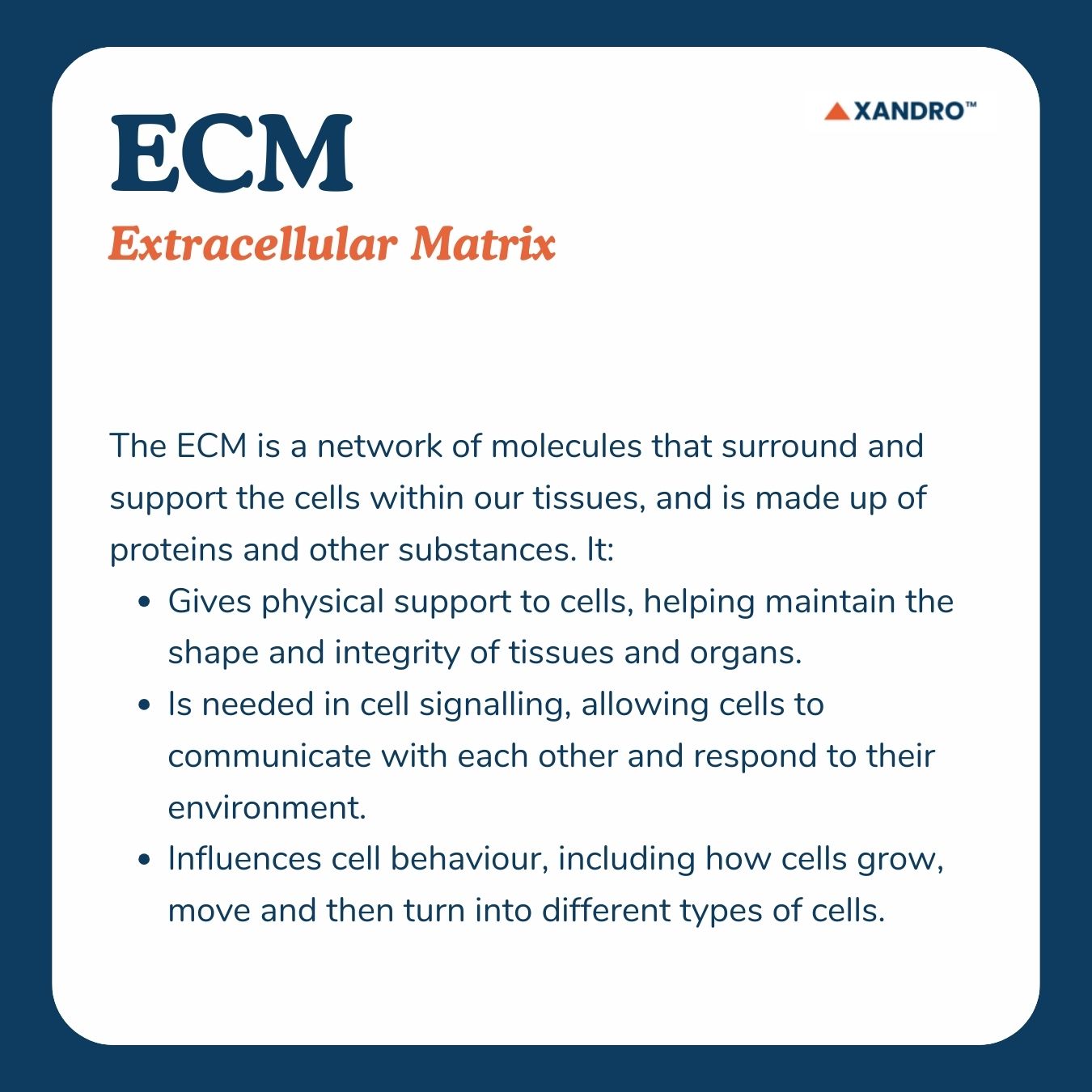
This refers to the complex networks of hormones and the signals they send throughout the body to regulate various functions, including growth, metabolism and stress responses. Hormones are chemical messengers produced by glands in the endocrine system and they play a vital role in maintaining balance and health.
Researchers are also looking at ways of regulating hormones to balance growth and longevity. For example:
- Insulin and Insulin-Like Growth Factor (IGF): Insulin regulates blood sugar levels by helping cells absorb glucose and, similar to insulin, IGF-1 promotes growth and development. Lower insulin and IGF-1 signaling are linked with extended lifespan as reducing levels of these hormones can improve resistance to diseases, reduce cellular damage and enhance stress response mechanisms.
- Growth Hormone: Our growth hormones stimulate growth, cell reproduction and regeneration and too much can speed up aging and increase the risk of age-related diseases. Conversely, reduced levels are linked to longer lifespan and better health in older age.
- Thyroid Hormone: Thyroid hormones (T3 and T4) regulate our metabolism, energy production and growth, and optimal levels of thyroid hormones are crucial for health. Both hyperthyroidism (high levels) and hypothyroidism (low levels) can negatively impact longevity, so balanced thyroid function supports metabolism and energy efficiency, contributing to healthy aging.
- Sex Hormones: Oestrogen and testosterone regulate many areas of our bodies, such as our reproductive functions, muscle mass and bone density, and having balanced levels is important for overall health. Oestrogen, for instance, has protective cardiovascular effects, while testosterone supports muscle and bone health. Hormone replacement therapy in postmenopausal women and testosterone supplementation in men with low levels can improve quality of life and health outcomes, although they need to be carefully managed.
- Cortisol: Known as the ‘stress hormone,’ it regulates the body's response to stress, inflammation and metabolism. Chronic high levels of cortisol can lead to negative health effects like high blood pressure, weakened immune function and increased risk of chronic diseases. Managing stress and maintaining balanced cortisol levels is important for healthy aging.
Another factor that may contribute to aging is inflammation.
Managing chronic low-grade inflammation, which contributes to aging and age-related diseases, through anti-inflammatory interventions.
Inflammation is a natural response by the body to fight infections and heal injuries, so it’s actually a good thing. It becomes detrimental when inflammation becomes chronic, meaning it lasts a long time, and this has been found to contribute to aging.
Essentially, chronic inflammation constantly signals the immune system to attack, even if there isn’t a real threat, which can damage healthy cells and tissues over time. Inflammation also leads to the release of chemicals that, while trying to heal, can also cause wear and tear on tissues, accelerating aging. Excessive inflammation also puts stress on cells, causing them to function less efficiently, which can lead to cellular aging, where cells lose their ability to divide and function properly.
Something that we have spoken about numerous times in our blogs is how long-term inflammation can cause tissues to break down, leading to conditions like arthritis in joints or atherosclerosis in blood vessels. This degeneration contributes to the physical and functional decline associated with aging, and since inflammation interferes with the body’s ability to heal properly, minor injuries or infections can have lasting impacts, which also ages us.
What’s more, chronic inflammation produces free radicals, which are unstable molecules that can damage cells. This oxidative stress speeds up the aging process by harming DNA, proteins and cell membranes.
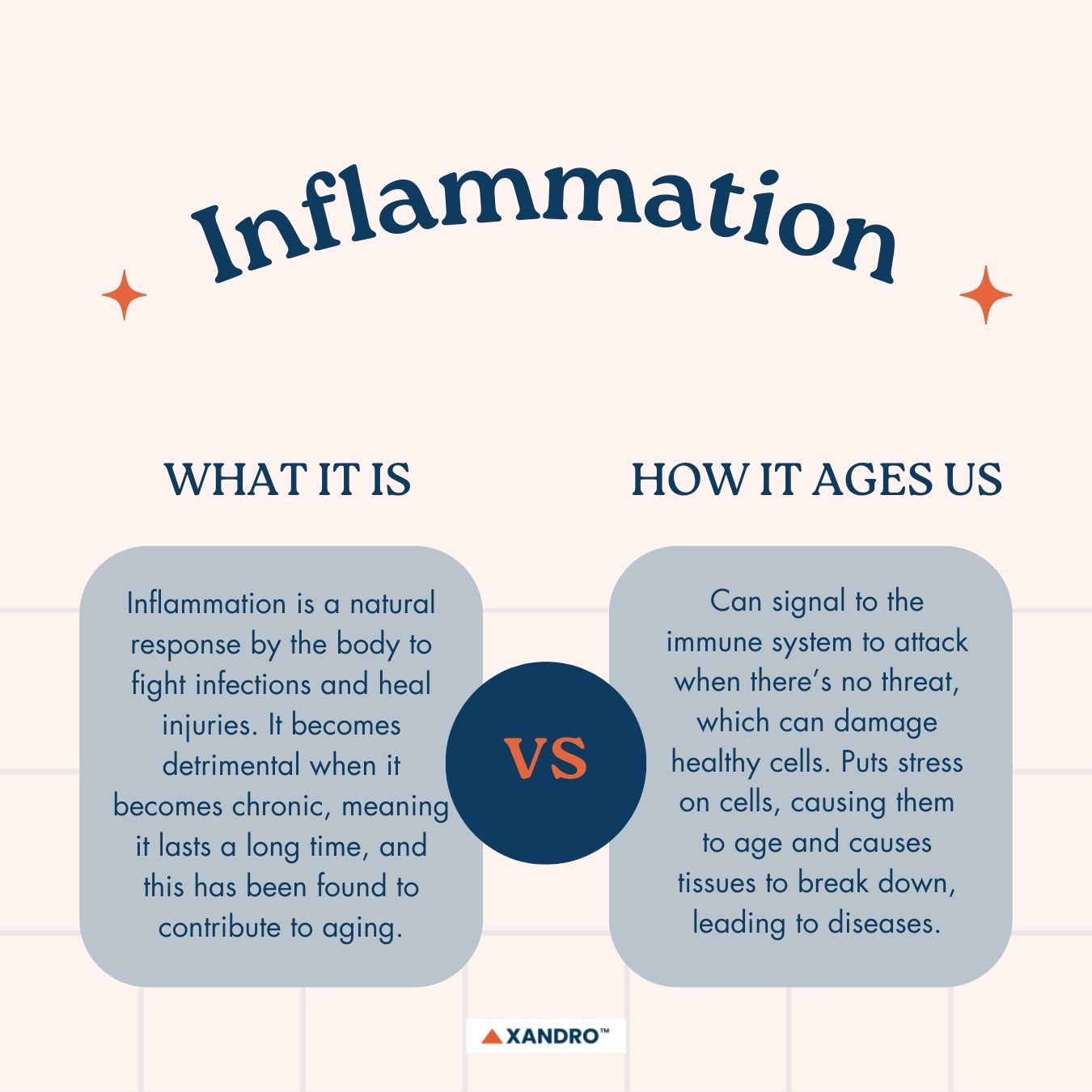
Genomic stability refers to the maintenance and integrity of our DNA over time. DNA contains the genetic information that guides the development, functioning and reproduction of all living organisms, and keeping our DNA stable and intact is crucial for preventing diseases and ensuring healthy aging.
Maintaining genomic stability helps prevent mutations that can lead to diseases such as cancer, and a buildup of DNA damage over time is a significant factor in the development of age-related diseases. DNA damage can also cause cells to malfunction, leading to tissue deterioration and organ failure, so by preserving genomic stability, cells and tissues can function optimally for longer periods. Cells with significant DNA damage can also enter a state of senescence, where they stop dividing but don't die (see above), which can speed up aging.
It's for this reason that researchers are looking into DNA repair mechanisms to help cells repair DNA damage. They are hoping to help maintain genomic stability and prevent age-related decline, especially since DNA degradation is one of the key factors in cellular aging.
Our gut health is incredibly important to our longevity. The microbiome is the collection of trillions of microorganisms, including bacteria, viruses, fungi and other microbes, that live in and on our bodies, especially in the gut. These microbes help with digestion, produce vitamins, protect against harmful bacteria and support the immune system.
A healthy microbiome helps break down food and absorb nutrients, which are essential for overall health and energy, so having good digestion supports longevity by ensuring your body gets the fuel it needs. The microbiome also trains and regulates the immune system, helping it fight off infections and diseases, which is needed for long-term health.
Certain microbes in the gut can help reduce chronic inflammation, which is linked to many age-related diseases like heart disease, diabetes and Alzheimer’s (as mentioned above). Interestingly, our gut microbiome communicates with the brain through the gut-brain axis, and it’s been found that a healthy gut can lead to better mood and mental health, which are important for a good quality of life as you age.
The microbiome plays a role in metabolism and weight regulation. A balanced microbiome can help prevent metabolic disorders like obesity and diabetes, which can affect longevity, and similarly, a diverse and balanced microbiome (all the good and bad bacteria) can protect against harmful bacteria and pathogens, reducing the risk of infections and diseases that can shorten lifespan.
Further Reading:The Importance of Gut Health
These pathways represent a diverse range of approaches to understanding and potentially extending human longevity. As research progresses, a combination of these strategies will likely contribute to advancements in healthy aging and increased lifespan.
Yamanaka Factors are a set of four specific proteins (Oct4, Sox2, Klf4 and c-Myc) that can reprogram adult cells back into a pluripotent state, meaning they can become any type of cell in the body, similar to embryonic stem cells. When these four factors are introduced into adult cells, they trigger a process that resets the cells to a pluripotent state. This process is known as induced pluripotent stem cell (iPSC) technology.
By resetting cells to a pluripotent state, the Yamanaka Factors can potentially rejuvenate old or damaged cells, restoring their youthful functions and extending their lifespan.Reprogrammed cells can then be used to generate new, healthy tissues, which can replace damaged or aged tissues in the body. This has implications for regenerative medicine and age-related diseases.
iPSCs can also be used to create models of human diseases, allowing researchers to study age-related diseases and test potential treatments in a laboratory setting. Applying Yamanaka Factors in a controlled way might help reduce the number of senescent cells in the body, which are cells that have stopped dividing and contribute to aging and inflammation.
Dr. David Sinclair’s further research into Yamanaka genes has been bringing them to the spotlight in recent years. Research has shown that, when activated, these genes extended the remaining lifespan in aged mice by 109%, which may be able to be replicated in humans to rejuvenate tissues and cells.
A range of lifestyle and cultural factors can also affect how long we live. It’s interesting to learn about how the daily decisions we make that shape our careers and life paths can affect our longevity, but the research on this is growing, causing us to reflect and be mindful of the choices we make.
So, what are the three longevity pathways that we shape in our everyday lives?
Psychological Factors
As you well know, mental health is incredibly important and research has now shown a link between optimism and longevity. Two studies found that optimistic individuals tend to live longer and have better emotional health in older age, suggesting that psychological interventions to increase optimism could be a potential pathway to extend lifespan.
Lifestyle Factors
We’ve spoken about this fact a lot and it’s the one that’s the easiest to change right now in your life. Picking up healthier lifestyle behaviours such as exercise, diet and avoiding smoking account for about 25% of the link between lifestyle and aging, causing researchers to continue to investigate how these factors contribute to longevity.
Life Course Factors
A cultural factor that may increase longevity is what we decide for our life course. This may sound strange and you might be confused with how we decide to live our lives correlates to how long we live, but links are being found. Studies are examining the role of work, retirement, volunteerism and education across the life course in generating a ‘longevity dividend’ that benefits all people.
Calorie restriction involves reducing the amount of calories consumed without causing malnutrition. This means eating fewer calories while still getting all the necessary nutrients your body needs to function properly.
The primary principle is to consume fewer calories than usual, typically by 20–30%, without depriving the body of essential vitamins, minerals and nutrients. The reason to do this is because calorie restriction influences various biological pathways that improve the efficiency and health of cells. It triggers changes in hormone levels, such as reduced insulin and IGF-1, which are associated with aging and metabolism (see above).
It's been found to improve the efficiency of DNA repair mechanisms, reducing the build-up of genetic damage that can lead to aging and disease. It lowers the production of reactive oxygen species ( ROS), which can damage cells and tissues, with less oxidative stress meaning less cellular damage over time.
Calorie restriction also improves how our metabolism functions and reduces the risk of metabolic diseases like diabetes by improving insulin sensitivity and reducing blood sugar levels. It’s also been found to activate certain genes associated with longevity, such as SIRT1, which helps protect cells and improve their function. What’s more, chronic inflammation is a major factor in aging and age-related diseases, which calorie restriction helps to reduce by lowering levels of inflammatory markers in the body.
There are also other dietary changes you can make, such as intermittent fasting, which is where you undertake timed periods of eating and fasting to influence metabolic pathways and improve longevity markers. Longevity gurus such as David Sinclair, Valter Longo and Bryan Johnson all do some form of dietary intervention.
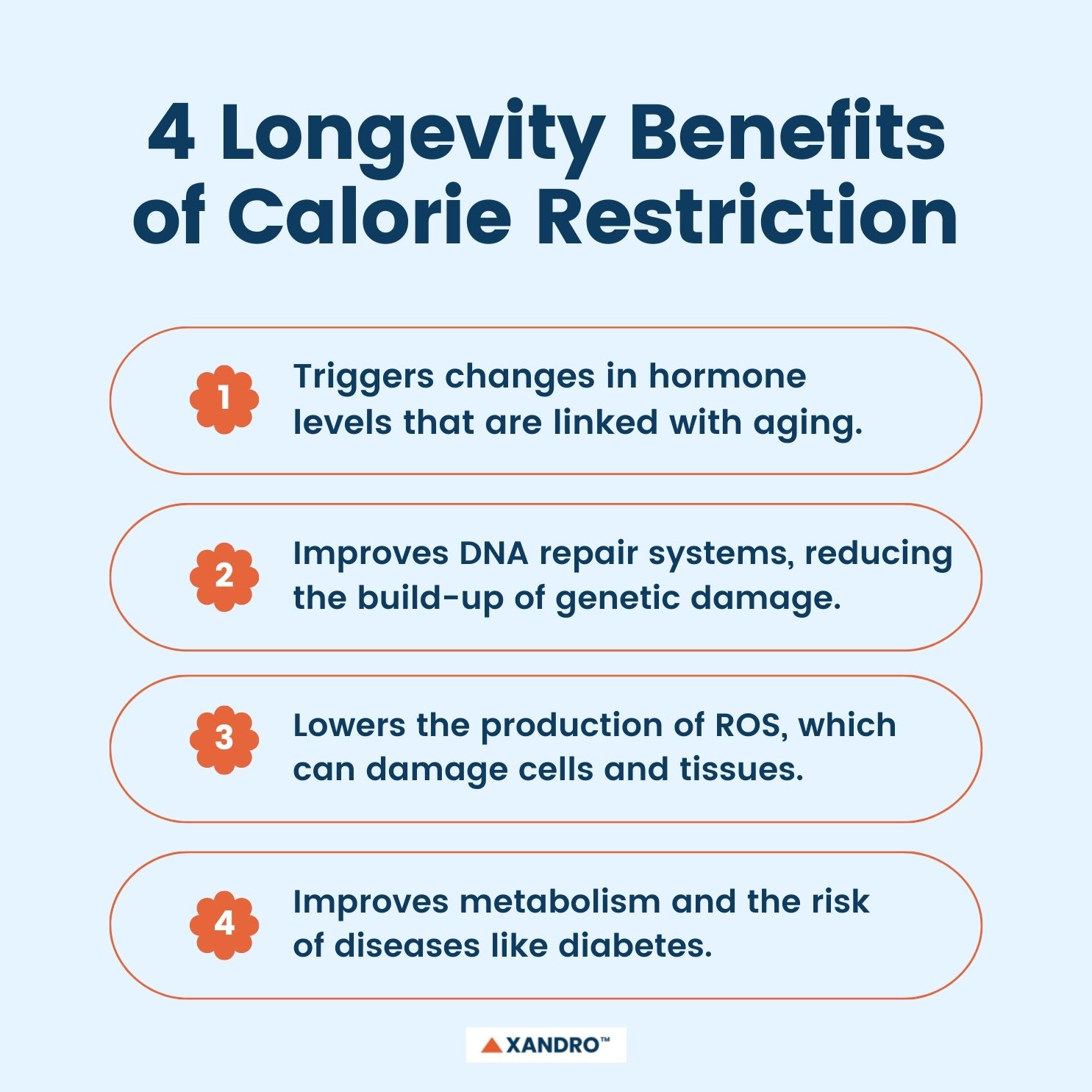
Further Reading: Intermittent Fasting for Longevity
Exercise is one of the most effective ways to live longer and improve overall health. It strengthens your heart, making it more efficient at pumping blood, as well as helping lower blood pressure and improve cholesterol levels, reducing the risk of heart disease. Regular physical activity also helps control weight by burning calories and building muscle, which is important as it lowers the risk of conditions like obesity, diabetes and certain cancers.
Exercise, especially weight-bearing activities, also strengthens bones and muscles, which helps reduce the risk of osteoporosis and frailty, helping you stay active and independent as you age (which also improves mental health). Speaking of, physical activity releases endorphins, which are natural mood lifters, reducing the risk of depression and anxiety. It also increases blood flow to the brain, helping maintain brain health and cognitive function, meaning it can reduce the risk of neurodegenerative diseases like Alzheimer's.
It's also an immune system boost! Regular exercise strengthens the immune system, making it more effective at fighting off infections and diseases, and it helps reduce chronic inflammation, which is linked to many age-related diseases, as mentioned above. Exercise also helps you get better sleep, which is incredibly important for your overall health, especially since it helps the body repair and rejuvenate. What’s more, it also boosts your overall energy levels, making you feel more vibrant and active.
Further Reading: Exercise Anti-Aging Routine
Rapalogs are drugs that can mimic the effects of Rapamycin, which is known for its ability to extend lifespan in various organisms, including yeast, worms, flies and mice. They work by blocking mTOR (read more above), which is involved in cell growth, metabolism and survival.
By blocking mTOR, Rapalogs can slow down cell growth and promote a state similar to fasting, which has been linked to a longer lifespan. By doing this, they may also improve cellular function and reduce the risk of age-related diseases like cancer, heart disease and neurodegenerative conditions. They also enhance autophagy, a process where cells clean out damaged components, which is crucial for maintaining cell health and function as we age.
While they shouldn’t be your only longevity solution, supplements can help extend your lifespan when used together with other lifestyle changes. Some you can take include:
- NAD Boosters: NMN (Nicotinamide Mononucleotide) supplementation, which is a precursor to NAD+ that helps produce cell energy and is used for many metabolic processes in the body.
- Resveratrol: May activate sirtuins that regulate aging, inflammation and metabolism, improve mitochondrial function and has antioxidant properties.
- Metformin: A type 2 diabetes drug that David Sinclair takes, but speak to your doctor before using. Can be used to treat prediabetes, improve the body’s response to insulin, lower mTOR production and have anti-inflammatory effects.
Further Reading: Learn All About Longevity Ingredients
As you can tell, longevity is complicated and there is a magnitude of reasons for why we age. Researchers are now investigating longevity from various angles, including academic research and industrial applications, to address critical healthcare concerns related to aging.
End Note
As you can see, longevity and the ways that humans age vary. The processes in our bodies overlap and link, and one problem can lead to another. This also leads to many exciting developments in the longevity field as there are currently a wide variety of clinical trials underway to test different longevity-promoting pathways.
Until conclusive results come out, though, we’re given the same advice as always: eat a healthy, balanced diet, exercise, get enough sleep and reduce your stress. Plus, on top of all of this, you can speak with your doctor and check if there are any supplements that may help. There is a range of longevity supplements on the market to test out, as long as they don’t interfere with the medications you’re taking.
Further Reading: Ultimate Guide to Longevity and Supplements
As Xandro Lab’s CEO, Shantanu Kumar explains, it’s about increasing your health span, not your lifespan.
“Health span is the total number of years a person is healthy.”
If you’re looking for a vitamin and supplement store Singapore, make sure to check out Xandro Lab’s supplements, such as our
Longevity Plus bundle!
